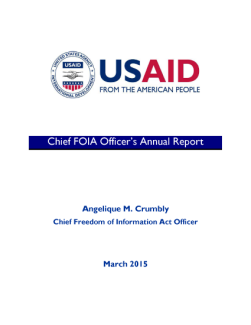USAID rolled out the Public Access Link (PAL) in FY 2014. The PAL allows FOIA requesters to submit their request on-line; attach supporting documents; correspond with the Government Information Specialist assigned to their request; receive status updates; view the entire request submission history; and also receive the final response letter and documents. The portal also allows the public to download frequently requested records from USAID’s FOIA Library.
In accordance with the Attorney General’s guidelines, USAID closed its ten oldest FOIA requests, administrative appeals and consultations in FY 2014. To do so, an “Oldest Ten Taskforce” (Taskforce) was created to focus on these complex requests. The Taskforce worked these requests while simultaneously processing their ordinary case loads.
USAID improved its average number of days to adjudicate request for expedited processing from 78.85 days in FY2013 to 3.3 days in FY2014.
USAID launched an expanded Records Management & Access agency-wide training. Building on the importance of records management when searching for agency records in response to a FOIA request, the “Access” or FOIA component was added to what is now a week-long training. The training includes a FOIA overview, how to scope a request, how to conduct a search for responsive records, and the importance of an administrative record to help ensure compliance. The instructor-led course is delivered globally and is met with great interest and demand.
On October 15, 2014, USAID announced the release of its finalized open data policy (ADS 579 - Development Data). The policy emphasizes the importance of viewing data as valuable "development capital" that can best serve the global good when widely shared. It also carries a requirement (via changes to standard procurement language) for implementing partners to submit data funded by USAID to the Development Data Library at www.usaid.gov/data. This bold step in the Agency's proactive disclosure program has prompted publicity from FedScoop and FedTech magazine.

